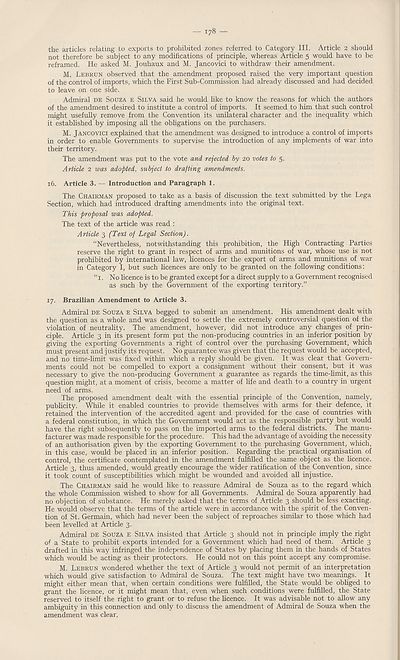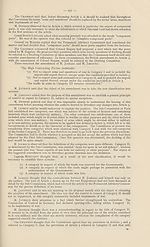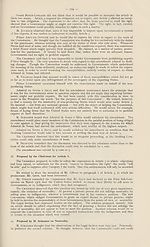Armament > Conference for the control of the international trade in arms, munitions and implements of war
(180)
Download files
Complete book:
Individual page:
Thumbnail gallery: Grid view | List view

•— 178 —
the articles relating to exports to prohibited zones referred to Category 111. Article 2 should
not therefore be subject to any modifications of principle, whereas Article 5 would have to be
reframed. He asked M. Jouhaux and M. Jancovici to withdraw their amendment.
M. Lebrun observed that the amendment proposed raised the very important question
of the control of imports, which the First Sub-Commission had already discussed and had decided
to leave on one side.
Admiral de Souza e Silva said he would like to know the reasons for which the authors
of the amendment desired to institute a control of imports. It seemed to him that such control
might usefully remove from the Convention its unilateral character and the inequality which
it established by imposing all the obligations on the purchasers.
M. Jancovici explained that the amendment was designed to introduce a control of imports
in order to enable Governments to supervise the introduction of any implements of war into
their territory.
The amendment was put to the vote and rejected by 20 votes to 5.
Article 2 was adopted, subject to drafting amendments.
16. Article 3. — Introduction and Paragraph 1.
The Chairman proposed to take as a basis of discussion the text submitted by the Lega
Section, which had introduced drafting amendments into the original text.
This proposal was adopted.
The text of the article was read :
Article 3 (Text of Legal Section).
"Nevertheless, notwithstanding this prohibition, the High Contracting Parties
reserve the right to grant in respect of arms and munitions of war, whose use is not
prohibited by international law, licences for the export of arms and munitions of war
in Category I, but such licences are only to be granted on the following conditions:
‘T. No licence is to be granted except for a direct supply to a Government recognised
as such by the Government of the exporting teiritory.”
17. Brazilian Amendment to Article 3.
Admiral de Souza e Silva begged to submit an amendment. His amendment dealt with
the question as a whole and was designed to settle the extremely controversial question of the
violation of neutrality. The amendment, however, did not introduce any changes of prin¬
ciple. Article 3 in its present form put the non-producing countries in an inferior position by
giving the exporting Governments a right of control over the purchasing Government, which
must present and justify its request. No guarantee was given that the request would be accepted,
and no time-limit was fixed within which a reply should be given. It was clear that Govern¬
ments could not be compelled to export a consignment without their consent, but it was
necessary to give the non-producing Government a guarantee as regards the time-limit, as this
question might, at a moment of crisis, become a matter of life and death to a country in urgent
need of arms.
The proposed amendment dealt with the essential principle of the Convention, namely,
publicity. While it enabled countries to provide themselves with arms for their defence, it
retained the intervention of the accredited agent and provided for the case of countries with
a federal constitution, in which the Government would act as the responsible party but would
have the right subsequently to pass on the imported arms to the federal districts. The manu¬
facturer was made responsible for the procedure. This had the advantage of avoiding the necessity
of an authorisation given by the exporting Government to the purchasing Government, which,
in this case, would be placed in an inferior position. Regarding the practical organisation of
control, the certificate contemplated in the amendment fulfilled the same object as the licence.
Article 3, thus amended, would greatly encourage the wider ratification of the Convention, since
it took count of susceptibilities which might be wounded and avoided all injustice.
The Chairman said he would like to reassure Admiral de Souza as to the regard which
the whole Commission wished to show for all Governments. Admiral de Souza apparently had
no objection of substance. He merely asked that the terms of Article 3 should be less exacting.
He would observe that the terms of the article were in accordance with the spirit of the Conven¬
tion of St. Germain, which had never been the subject of reproaches similar to those which had
been levelled at Article 3.
Admiral de Souza e Silva insisted that Article 3 should not in principle imply the right
of a State to prohibit exports intended for a Government which had need of them. Article 3
drafted in this way infringed the independence of States by placing them in the hands of States
which would be acting as their protectors. He could not on this point accept any compromise.
M. Lebrun wondered whether the text of Article 3 would not permit of an interpretation
which would give satisfaction to Admiral de Souza. The text might have two meanings. It
might either mean that, when certain conditions were fulfilled, the State would be obliged to
grant the licence, or it might mean that, even when such conditions were fulfilled, the State
reserved to itself the right to grant or to refuse the licence. It was advisable not to allow any
ambiguity in this connection and only to discuss the amendment of Admiral de Souza when the
amendment was clear.
the articles relating to exports to prohibited zones referred to Category 111. Article 2 should
not therefore be subject to any modifications of principle, whereas Article 5 would have to be
reframed. He asked M. Jouhaux and M. Jancovici to withdraw their amendment.
M. Lebrun observed that the amendment proposed raised the very important question
of the control of imports, which the First Sub-Commission had already discussed and had decided
to leave on one side.
Admiral de Souza e Silva said he would like to know the reasons for which the authors
of the amendment desired to institute a control of imports. It seemed to him that such control
might usefully remove from the Convention its unilateral character and the inequality which
it established by imposing all the obligations on the purchasers.
M. Jancovici explained that the amendment was designed to introduce a control of imports
in order to enable Governments to supervise the introduction of any implements of war into
their territory.
The amendment was put to the vote and rejected by 20 votes to 5.
Article 2 was adopted, subject to drafting amendments.
16. Article 3. — Introduction and Paragraph 1.
The Chairman proposed to take as a basis of discussion the text submitted by the Lega
Section, which had introduced drafting amendments into the original text.
This proposal was adopted.
The text of the article was read :
Article 3 (Text of Legal Section).
"Nevertheless, notwithstanding this prohibition, the High Contracting Parties
reserve the right to grant in respect of arms and munitions of war, whose use is not
prohibited by international law, licences for the export of arms and munitions of war
in Category I, but such licences are only to be granted on the following conditions:
‘T. No licence is to be granted except for a direct supply to a Government recognised
as such by the Government of the exporting teiritory.”
17. Brazilian Amendment to Article 3.
Admiral de Souza e Silva begged to submit an amendment. His amendment dealt with
the question as a whole and was designed to settle the extremely controversial question of the
violation of neutrality. The amendment, however, did not introduce any changes of prin¬
ciple. Article 3 in its present form put the non-producing countries in an inferior position by
giving the exporting Governments a right of control over the purchasing Government, which
must present and justify its request. No guarantee was given that the request would be accepted,
and no time-limit was fixed within which a reply should be given. It was clear that Govern¬
ments could not be compelled to export a consignment without their consent, but it was
necessary to give the non-producing Government a guarantee as regards the time-limit, as this
question might, at a moment of crisis, become a matter of life and death to a country in urgent
need of arms.
The proposed amendment dealt with the essential principle of the Convention, namely,
publicity. While it enabled countries to provide themselves with arms for their defence, it
retained the intervention of the accredited agent and provided for the case of countries with
a federal constitution, in which the Government would act as the responsible party but would
have the right subsequently to pass on the imported arms to the federal districts. The manu¬
facturer was made responsible for the procedure. This had the advantage of avoiding the necessity
of an authorisation given by the exporting Government to the purchasing Government, which,
in this case, would be placed in an inferior position. Regarding the practical organisation of
control, the certificate contemplated in the amendment fulfilled the same object as the licence.
Article 3, thus amended, would greatly encourage the wider ratification of the Convention, since
it took count of susceptibilities which might be wounded and avoided all injustice.
The Chairman said he would like to reassure Admiral de Souza as to the regard which
the whole Commission wished to show for all Governments. Admiral de Souza apparently had
no objection of substance. He merely asked that the terms of Article 3 should be less exacting.
He would observe that the terms of the article were in accordance with the spirit of the Conven¬
tion of St. Germain, which had never been the subject of reproaches similar to those which had
been levelled at Article 3.
Admiral de Souza e Silva insisted that Article 3 should not in principle imply the right
of a State to prohibit exports intended for a Government which had need of them. Article 3
drafted in this way infringed the independence of States by placing them in the hands of States
which would be acting as their protectors. He could not on this point accept any compromise.
M. Lebrun wondered whether the text of Article 3 would not permit of an interpretation
which would give satisfaction to Admiral de Souza. The text might have two meanings. It
might either mean that, when certain conditions were fulfilled, the State would be obliged to
grant the licence, or it might mean that, even when such conditions were fulfilled, the State
reserved to itself the right to grant or to refuse the licence. It was advisable not to allow any
ambiguity in this connection and only to discuss the amendment of Admiral de Souza when the
amendment was clear.
Set display mode to:
![]() Universal Viewer |
Universal Viewer | ![]() Mirador |
Large image | Transcription
Mirador |
Large image | Transcription
Images and transcriptions on this page, including medium image downloads, may be used under the Creative Commons Attribution 4.0 International Licence unless otherwise stated. ![]()
| League of Nations > Armament > Conference for the control of the international trade in arms, munitions and implements of war > (180) |
|---|
| Permanent URL | https://digital.nls.uk/195384103 |
|---|
| Shelfmark | LN.IX |
|---|
| Description | Over 1,200 documents from the non-political organs of the League of Nations that dealt with health, disarmament, economic and financial matters for the duration of the League (1919-1945). Also online are statistical bulletins, essential facts, and an overview of the League by the first Secretary General, Sir Eric Drummond. These items are part of the Official Publications collection at the National Library of Scotland. |
|---|---|
| Additional NLS resources: |
|

